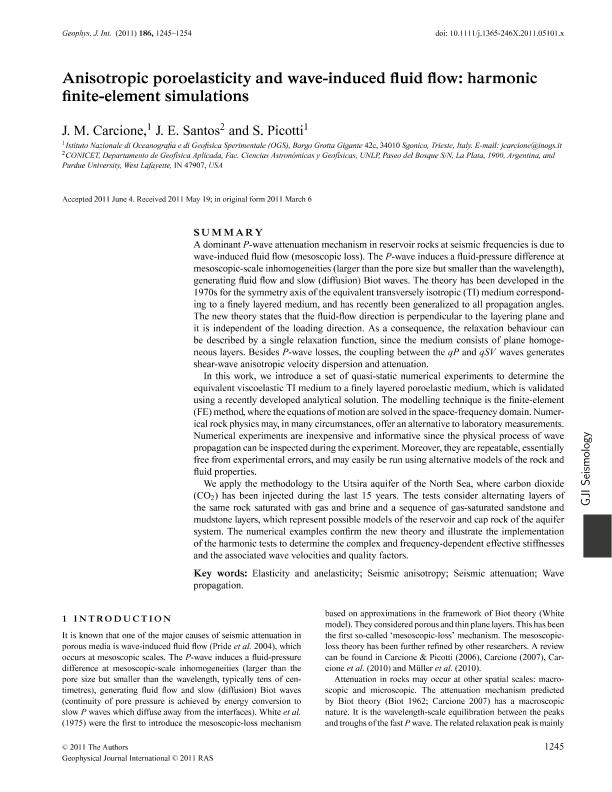Mostrar el registro sencillo del ítem
dc.contributor.author
Carcione, J .M.
dc.contributor.author
Santos, Juan Enrique

dc.contributor.author
Picotti, S.
dc.date.available
2023-02-08T11:35:01Z
dc.date.issued
2011-06
dc.identifier.citation
Carcione, J .M.; Santos, Juan Enrique; Picotti, S.; Anisotropic poroelasticity and wave-induced fluid flow: Harmonic finite-element simulations; Wiley Blackwell Publishing, Inc; Geophysical Journal International; 186; 3; 6-2011; 1245-1254
dc.identifier.issn
0956-540X
dc.identifier.uri
http://hdl.handle.net/11336/187249
dc.description.abstract
A dominant P-wave attenuation mechanism in reservoir rocks at seismic frequencies is due to wave-induced fluid flow (mesoscopic loss). The P-wave induces a fluid-pressure difference at mesoscopic-scale inhomogeneities (larger than the pore size but smaller than the wavelength), generating fluid flow and slow (diffusion) Biot waves. The theory has been developed in the 1970s for the symmetry axis of the equivalent transversely isotropic (TI) medium corresponding to a finely layered medium, and has recently been generalized to all propagation angles. The new theory states that the fluid-flow direction is perpendicular to the layering plane and it is independent of the loading direction. As a consequence, the relaxation behaviour can be described by a single relaxation function, since the medium consists of plane homogeneous layers. Besides P-wave losses, the coupling between the qP and qSV waves generates shear-wave anisotropic velocity dispersion and attenuation. In this work, we introduce a set of quasi-static numerical experiments to determine the equivalent viscoelastic TI medium to a finely layered poroelastic medium, which is validated using a recently developed analytical solution. The modelling technique is the finite-element (FE) method, where the equations of motion are solved in the space-frequency domain. Numerical rock physics may, in many circumstances, offer an alternative to laboratory measurements. Numerical experiments are inexpensive and informative since the physical process of wave propagation can be inspected during the experiment. Moreover, they are repeatable, essentially free from experimental errors, and may easily be run using alternative models of the rock and fluid properties. We apply the methodology to the Utsira aquifer of the North Sea, where carbon dioxide (CO2) has been injected during the last 15 years. The tests consider alternating layers of the same rock saturated with gas and brine and a sequence of gas-saturated sandstone and mudstone layers, which represent possible models of the reservoir and cap rock of the aquifer system. The numerical examples confirm the new theory and illustrate the implementation of the harmonic tests to determine the complex and frequency-dependent effective stiffnesses and the associated wave velocities and quality factors.
dc.format
application/pdf
dc.language.iso
eng
dc.publisher
Wiley Blackwell Publishing, Inc

dc.rights
info:eu-repo/semantics/openAccess
dc.rights.uri
https://creativecommons.org/licenses/by-nc-sa/2.5/ar/
dc.subject
ELASTICITY AND ANELASTICITY
dc.subject
SEISMIC ANISOTROPY
dc.subject
SEISMIC ATTENUATION
dc.subject
WAVE PROPAGATION
dc.subject.classification
Geociencias multidisciplinaria

dc.subject.classification
Ciencias de la Tierra y relacionadas con el Medio Ambiente

dc.subject.classification
CIENCIAS NATURALES Y EXACTAS

dc.title
Anisotropic poroelasticity and wave-induced fluid flow: Harmonic finite-element simulations
dc.type
info:eu-repo/semantics/article
dc.type
info:ar-repo/semantics/artículo
dc.type
info:eu-repo/semantics/publishedVersion
dc.date.updated
2023-02-02T12:50:34Z
dc.journal.volume
186
dc.journal.number
3
dc.journal.pagination
1245-1254
dc.journal.pais
Reino Unido

dc.journal.ciudad
Londres
dc.description.fil
Fil: Carcione, J .M.. Istituto Nazionale di Oceanografia e di Geofisica Sperimentale; Italia
dc.description.fil
Fil: Santos, Juan Enrique. Universidad Nacional de La Plata. Facultad de Ciencias Astronómicas y Geofísicas. Departamento de Geofísica Aplicada; Argentina. Consejo Nacional de Investigaciones Científicas y Técnicas; Argentina
dc.description.fil
Fil: Picotti, S.. Istituto Nazionale di Oceanografia e di Geofisica Sperimentale; Italia
dc.journal.title
Geophysical Journal International

dc.relation.alternativeid
info:eu-repo/semantics/altIdentifier/url/https://academic.oup.com/gji/article/186/3/1245/591942
dc.relation.alternativeid
info:eu-repo/semantics/altIdentifier/doi/http://dx.doi.org/10.1111/j.1365-246X.2011.05101.x
Archivos asociados
